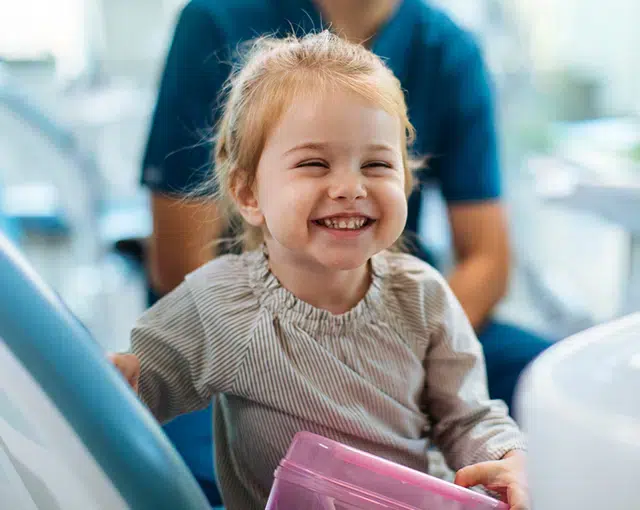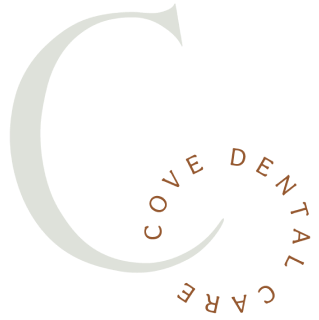105 Sheringham Dr Easley, SC 29642

Dental Care for Children Easley, SC
Establishing dental hygiene habits for your child should commence in infancy. Introducing a consistent oral care routine early on can significantly contribute to maintaining strong teeth and gums throughout their lifetime. An essential aspect of this regimen involves regular dental check-ups. At Cove Dental Care, we specialize in both adult and pediatric dentistry, ensuring comprehensive family care.
It is recommended that your child's initial dental visit occurs within six months of the eruption of their first tooth, or by their first birthday at the latest. Early dental appointments are crucial as tooth decay can occur as soon as teeth emerge. However, the first cleaning typically occurs between 12 and 36 months when most of the baby teeth have appeared. It is important to partner with an experienced children's dentist right from the outset to promote optimal oral health.
What Can I Expect During My Child's First Dental Examination?
What Happens if My Child Doesn't Participate?
It's common for both adults and children to experience dental anxiety. However, if your child is uncooperative or becomes particularly fearful, it's important to cultivate excitement about the first visit and future appointments. Here are some tips to assist you:
- Engage in a dialogue with your child regarding the dental appointment.
- Share books or watch videos about dentistry together with your child.
- Select a pediatric dentist, ideally one who creates a fun atmosphere.
- Book your appointment during times when your child is typically happiest and most cooperative.
- Lead by example by maintaining a cheerful and relaxed demeanor.
- Exercise patience with your child.
How Can I Prevent My Child from Getting Cavities?
Prevention is superior to treatment. As a parent, you aim to prevent dental cavities to avoid future complications. Here's how you can achieve that:
- Consistent brushing and flossing are essential. Begin brushing as soon as your child's first tooth emerges.
- Make sure your child consumes a balanced diet.
- Ensure your child stays well-hydrated by drinking plenty of water.
- To reduce the spread of bacteria, refrain from sharing food and beverages.
- Arrange regular dental appointments for your child.
- Consult your child's dentist regarding dental sealants, which provide protective measures against decay.
If you believe your child may have a cavity, arrange a dental examination without delay. Family dentistry includes the assessment and treatment of cavities in children.
Is It Recommended to Use Fluoride Toothpaste for Brushing My Child's Teeth?
How Frequently Should My Child Have Cleanings and Exams?
The Significance of Pediatric Dentistry
Children's dentistry is fundamental to early childhood development, nurturing a lifetime of excellent oral health and overall well-being. Its significance lies in addressing the unique needs and challenges that emerge during a child's formative years.
Firstly, pediatric dentistry plays a pivotal role in preventive care. Regular dental check-ups from an early age allow dentists to monitor the growth and development of a child's teeth, gums, and jaw. This proactive approach helps identify and address any issues before they escalate, reducing the need for more invasive treatments later on.
Secondly, instilling positive oral hygiene habits in childhood establishes a foundation for lifelong dental care. Children's dentists educate young patients about brushing, flossing, and maintaining a balanced diet, empowering them to take charge of their oral health and prevent dental issues as they grow.
Moreover, pediatric dentistry addresses developmental concerns such as tooth misalignment and bite problems. Early intervention can lead to more effective orthodontic treatments in the future, ensuring healthy smiles as children transition into adolescence and adulthood.
Children's dentistry also plays a crucial role in alleviating dental anxiety. Pediatric dental offices are designed to create a welcoming environment, easing children's fears and fostering trust in dental care.
Lastly, children's dentistry contributes to overall well-being by addressing oral health issues promptly. Untreated dental problems can cause pain and discomfort, affecting a child's eating, speaking, and socializing abilities.
In summary, children's dentistry goes beyond dental health, influencing a child's overall development and self-confidence. Through preventive care, education, and early intervention, it sets the stage for a lifetime of optimal oral health and a positive attitude towards dental care.

